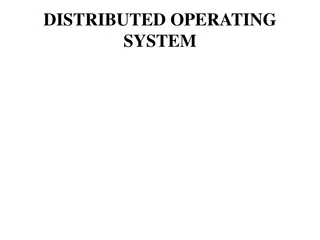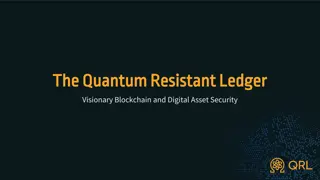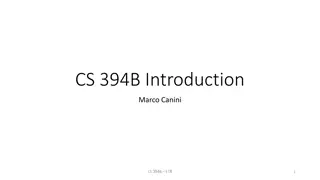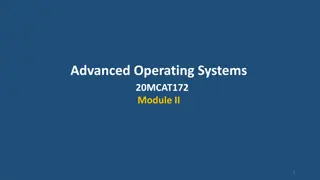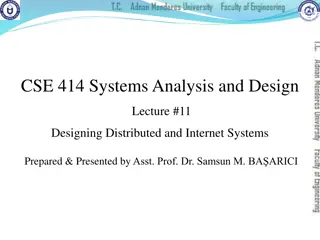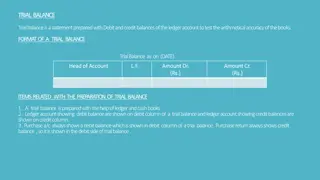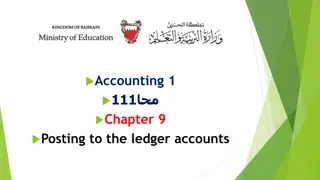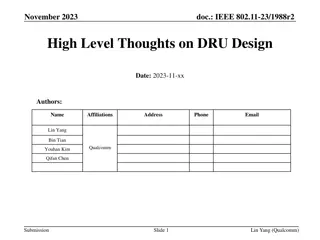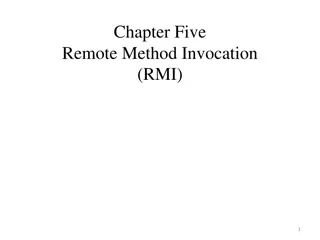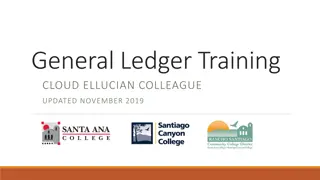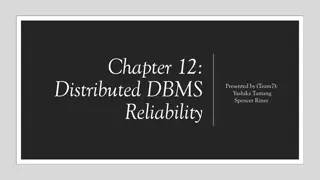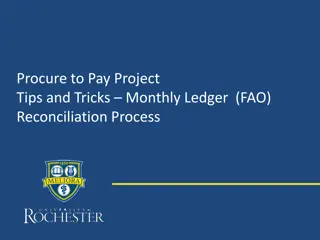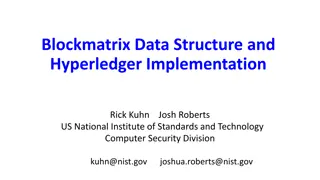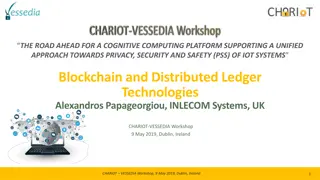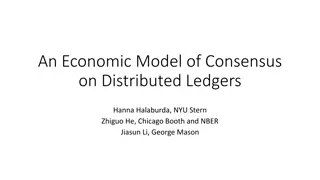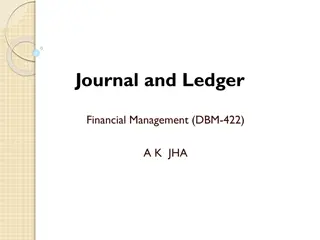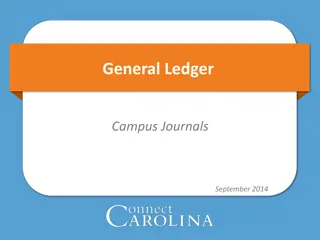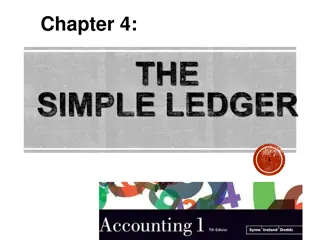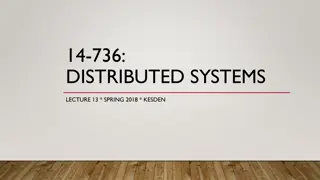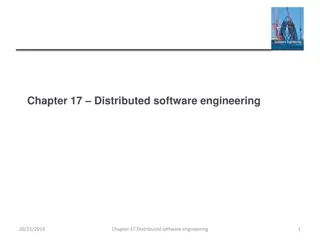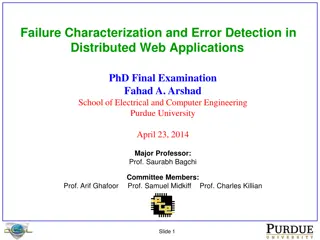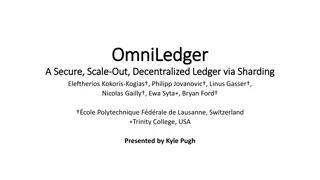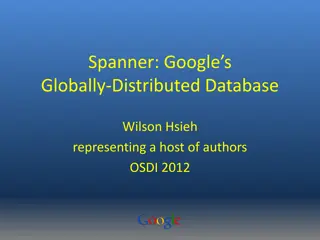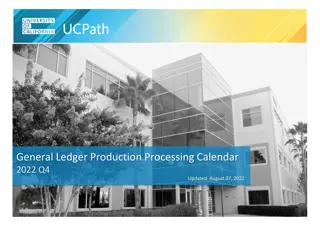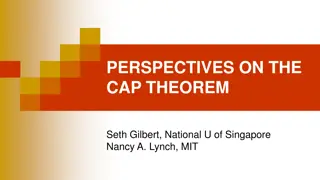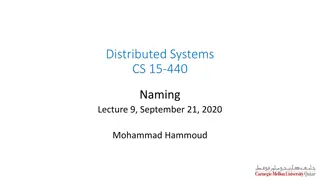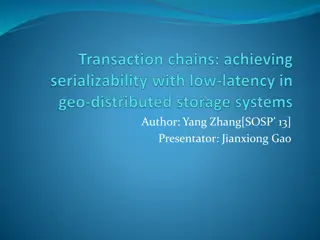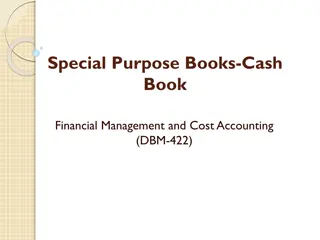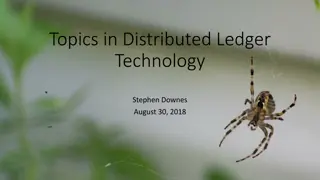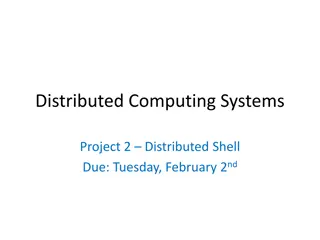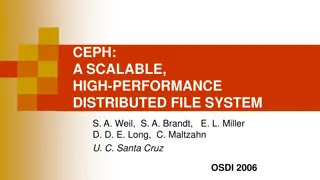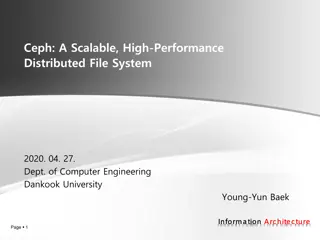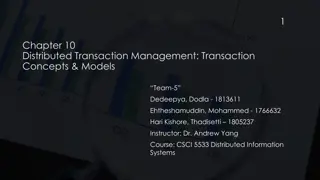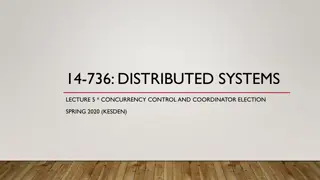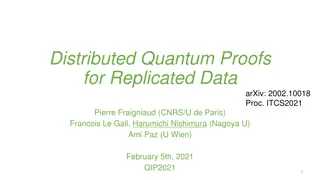Overview of Distributed Systems: Characteristics, Classification, Computation, Communication, and Fault Models
Characterizing Distributed Systems: Multiple autonomous computers with CPUs, memory, storage, and I/O paths, interconnected geographically, shared state, global invariants. Classifying Distributed Systems: Based on synchrony, communication medium, fault models like crash and Byzantine failures. Comp
9 views • 126 slides
Overview of Distributed Operating Systems
Distributed Operating Systems (DOS) manage computer resources and provide users with convenient interfaces. Unlike centralized systems, DOS runs on multiple independent CPUs and prioritizes software over hardware. It ensures transparency and fault tolerance, with a focus on software error handling.
1 views • 36 slides
Addressing The Quantum Threat: The Quantum Resistant Ledger
The Quantum Resistant Ledger (QRL) is a visionary blockchain and digital asset security solution designed to counter the emerging threat of quantum computing. With quantum technology advancing and traditional blockchains at risk, QRL offers an industrial-grade, quantum computer-resistant cryptocurre
2 views • 9 slides
Understanding CS 394B: Blockchain Systems and Distributed Consensus
This course, led by Assistant Professor Marco Canini, delves into the technical aspects of blockchain technologies, distributed consensus, and secure software engineering. Students will engage in flipped classroom-style classes and paper presentations, critiquing research papers, defending research
0 views • 65 slides
Understanding Distributed Mutual Exclusion in Operating Systems
In distributed systems, the problem of mutual exclusion arises when multiple sites/processes need to access shared resources concurrently. Unlike in single-computer systems, distributed systems lack shared memory, leading to the need for communication-based approaches rather than shared variables li
0 views • 49 slides
Understanding Parallel and Distributed Computing Systems
In parallel computing, processing elements collaborate to solve problems, while distributed systems appear as a single coherent system to users, made up of independent computers. Contemporary computing systems like mobile devices, IoT devices, and high-end gaming computers incorporate parallel and d
1 views • 11 slides
Designing Distributed and Internet Systems
Learn about the design considerations for distributed and internet systems, including file server versus client/server environments, cloud computing trends, internet standards, and system development life cycle. Explore designing systems for local area networks (LANs) and the process of creating dis
2 views • 51 slides
Understanding Trial Balance and Trading Account Preparation
Trial balance is a statement that tests the accuracy of ledger account balances, with debit balances displayed in the debit column and credit balances in the credit column. The preparation involves using ledger and cash books, with specific rules for different accounts such as purchases, sales, open
0 views • 6 slides
Understanding Ledger Accounts and Posting Transactions in Accounting
This content discusses the importance of ledger accounts and the process of posting journal entries to the ledger in accounting. It explains the general ledger, double-entry system, essential points to consider, and provides illustrations of posting transactions in various accounts like cash, suppli
2 views • 23 slides
High-Level Thoughts on Distributed Tone Resource Unit (dRU) Design in IEEE 802.11-23/1988r2 November 2023
Various aspects of Distributed Tone Resource Unit (dRU) design in IEEE 802.11-23/1988r2, such as PSD limitations, distributed transmission regulations, application areas, and open questions are discussed in this presentation by Lin Yang from Qualcomm. Topics include tone distribution, power pooling
0 views • 19 slides
Understanding Remote Method Invocation (RMI) in Distributed Systems
A distributed system involves software components on different computers communicating through message passing to achieve common goals. Organized with middleware like RMI, it allows for interactions across heterogeneous networks. RMI facilitates building distributed Java systems by enabling method i
1 views • 47 slides
Understanding Ellucian Colleague General Ledger Training
This document provides detailed information on Ellucian Colleague's general ledger training, including the accounting system, chart of accounts, common acronyms, and functionalities for managing budgets and expenditure reports. Learn about the structure of the Chart of Accounts, fund classifications
7 views • 46 slides
Distributed DBMS Reliability Concepts and Measures
Distributed DBMS reliability is crucial for ensuring continuous user request processing despite system failures. This chapter delves into fundamental definitions, fault classifications, and types of faults like hard and soft failures in distributed systems. Understanding reliability concepts helps i
0 views • 58 slides
Tips and Tricks for FAO Ledger Reconciliation Process
Discover valuable insights and strategies for reconciling your FAO ledger efficiently. Learn how to review transactions, verify budgets, and generate essential reports for accurate financial management. Ensure compliance and accuracy in your procure-to-pay project cycle.
0 views • 9 slides
Understanding Blockchain Data Structures and Hyperledger Implementation
Blockchain technology offers valuable properties but faces challenges with privacy and data deletion. Blockmatrix, a data structure, provides integrity protection with controlled edits, making it a viable solution for distributed database applications. This summary highlights the conflict between bl
0 views • 33 slides
Enhancing IoT Systems with Blockchain and Distributed Ledger Technologies
Explore the potential of blockchain and distributed ledger technologies in enhancing IoT systems, focusing on privacy, security, and safety. The workshop discusses the benefits and challenges of implementing DLT, as well as a reference IoT scenario in the manufacturing industry. Discover how DLT ena
0 views • 16 slides
Economic Models of Consensus on Distributed Ledgers in Blockchain Technology
This study delves into Byzantine Fault Tolerance (BFT) protocols in the realm of distributed ledgers, exploring the complexities of achieving consensus in trusted adversarial environments. The research examines the classic problem in computer science where distributed nodes communicate to reach agre
0 views • 34 slides
Distributed Consensus Models in Blockchain Networks
Economic and technical aspects of Byzantine Fault Tolerance (BFT) protocols for achieving consensus in distributed ledger systems are explored. The discussion delves into the challenges of maintaining trust in adversarial environments and the strategies employed by non-Byzantine nodes to mitigate un
0 views • 34 slides
Distributed Algorithms for Leader Election in Anonymous Systems
Distributed algorithms play a crucial role in leader election within anonymous systems where nodes lack unique identifiers. The content discusses the challenges and impossibility results of deterministic leader election in such systems. It explains synchronous and asynchronous distributed algorithms
2 views • 11 slides
Understanding Journal and Ledger in Financial Management
Explore the significance of the Journal and Ledger in financial management. Learn how transactions are recorded in chronological order, and understand the characteristics and steps involved in journalizing. Discover the different types of accounts like Personal and Real accounts that are essential f
0 views • 25 slides
Campus Journals and General Ledger Overview
Campus Journals in September 2014 cover various topics such as Icebreaker activities, Ground Rules, Safety procedures, Disclaimers, Class Format, Agenda for the session, Campus Journal types, and Transaction Types. The content includes descriptions of different journal types and transaction types, a
0 views • 43 slides
Understanding Ledger Accounts and Financial Position
Ledger accounts play a crucial role in recording individual item changes affecting financial position. Each balance sheet item has its own account, ensuring accurate financial tracking. The accounting equation dictates where assets, liabilities, and owner's equity are located on the balance sheet, w
0 views • 64 slides
Overview of Distributed Systems, RAID, Lustre, MogileFS, and HDFS
Distributed systems encompass a range of technologies aimed at improving storage efficiency and reliability. This includes RAID (Redundant Array of Inexpensive Disks) strategies such as RAID levels, Lustre Linux Cluster for high-performance clusters, MogileFS for fast content delivery, and HDFS (Had
0 views • 23 slides
Distributed Software Engineering Overview
Distributed software engineering plays a crucial role in modern enterprise computing systems where large computer-based systems are distributed over multiple computers for improved performance, fault tolerance, and scalability. This involves resource sharing, openness, concurrency, and fault toleran
0 views • 66 slides
Challenges in Detecting and Characterizing Failures in Distributed Web Applications
The final examination presented by Fahad A. Arshad at Purdue University in 2014 delves into the complexities of failure characterization and error detection in distributed web applications. The presentation highlights the reasons behind failures, such as limited testing and high developer turnover r
0 views • 53 slides
OmniLedger: Decentralized Ledger with Sharding
OmniLedger is a decentralized ledger using sharding to enhance scalability without compromising security. It addresses challenges such as validator selection, cross-shard transactions, and checkpointing. The proposed solution includes ByzCoinX for consensus and Atomix for atomic commit. Goals includ
0 views • 13 slides
Google Spanner: A Distributed Multiversion Database Overview
Represented at OSDI 2012 by Wilson Hsieh, Google Spanner is a globally distributed database system that offers general-purpose transactions and SQL query support. It features lock-free distributed read transactions, ensuring external consistency of distributed transactions. Spanner enables property
0 views • 27 slides
Ledger Reconciliation Best Practices and Guidelines
Guidelines for effective ledger reconciliation, including verification of transactions, use of source documents, and completion of necessary certifications to ensure accuracy and compliance.
0 views • 31 slides
UCPath General Ledger Processing Calendar Q4 2022
This document provides the UCPath General Ledger Processing Calendar for the fourth quarter of 2022, including important dates and activities such as on-cycle and off-cycle confirmations, local approval deadlines, batch runs, and holidays. It covers the months of October, November, and December with
0 views • 5 slides
Understanding the CAP Theorem in Distributed Systems
The CAP Theorem, as discussed by Seth Gilbert and Nancy A. Lynch, highlights the tradeoffs between Consistency, Availability, and Partition Tolerance in distributed systems. It explains how a distributed service cannot provide all three aspects simultaneously, leading to practical compromises and re
0 views • 28 slides
Understanding Distributed Hash Table (DHT) in Distributed Systems
In this lecture, Mohammad Hammoud discusses the concept of Distributed Hash Tables (DHT) in distributed systems, focusing on key aspects such as classes of naming, Chord DHT, node entities, key resolution algorithms, and the key resolution process in Chord. The session covers various components of D
0 views • 35 slides
Distributed Database Management and Transactions Overview
Explore the world of distributed database management and transactions with a focus on topics such as geo-distributed nature, replication, isolation among transactions, transaction recovery, and low-latency maintenance. Understand concepts like serializability, hops, and sequence number vectors in ma
0 views • 17 slides
Introduction to Subsidiary Books in Accounting
Business transactions are initially recorded in a Journal and then transferred to a Ledger for better organization. Subsidiary Books, such as Cash Book, Purchase Book, and Sales Book, help in recording specific types of transactions efficiently. These specialized books assist in preparing Ledger acc
0 views • 12 slides
Understanding Distributed Ledger Technology Concepts
Distributed Ledger Technology (DLT) involves core concepts like assets, ledgers, transactions, states, conditions, and inferences. It also includes distributed ledgers, cryptographic hash functions, construction of a blockchain, consensus mechanisms like proof of work, and examples of applications s
0 views • 27 slides
Distributed Computing Systems Project: Distributed Shell Implementation
Explore the concept of a Distributed Shell in the realm of distributed computing systems, where commands can be executed on remote machines with results returned to users. The project involves building a client-server setup for a Distributed Shell, incorporating functionalities like authentication,
0 views • 14 slides
Overview of Ceph Distributed File System
Ceph is a scalable, high-performance distributed file system designed for excellent performance, reliability, and scalability in very large systems. It employs innovative strategies like distributed dynamic metadata management, pseudo-random data distribution, and decoupling data and metadata tasks
0 views • 42 slides
Overview of Ceph: A Scalable Distributed File System
Ceph is a high-performance distributed file system known for its excellent performance, reliability, and scalability. It decouples metadata and data operations, leverages OSD intelligence for complexity distribution, and utilizes adaptive metadata cluster architecture. Ceph ensures the separation of
0 views • 23 slides
Distributed Transaction Management in CSCI 5533 Course
Exploring transaction concepts and models in distributed systems, Team 5 comprising Dedeepya, Dodla, Ehtheshamuddin, and Hari Kishore under the guidance of Dr. Andrew Yang delve into the intricacies of distributed transaction management in CSCI 5533 Distributed Information Systems.
0 views • 56 slides
Concurrency Control and Coordinator Election in Distributed Systems
This content delves into the key concepts of concurrency control and coordinator election in distributed systems. It covers classical concurrency control mechanisms like Semaphores, Mutexes, and Monitors, and explores the challenges and goals of distributed mutual exclusion. Various approaches such
0 views • 48 slides
Quantum Distributed Proofs for Replicated Data
This research explores Quantum Distributed Computing protocols for tasks like leader election, Byzantine agreement, and more. It introduces Quantum dMA protocols for verifying equality of replicated data on a network without shared randomness. The study discusses the need for efficient protocols wit
0 views • 28 slides

